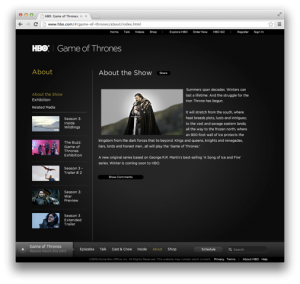Ethicists Make Lousy Economists, And Other Lessons From the Endless “Game of Thrones” Debate
 On March 31, the third season of HBO’s “Game of Thrones” will debut–and so will another round of squabbling over HBO not letting cord-cutting viewers pay to watch this drama alongside cable and satellite subscribers.
On March 31, the third season of HBO’s “Game of Thrones” will debut–and so will another round of squabbling over HBO not letting cord-cutting viewers pay to watch this drama alongside cable and satellite subscribers.
Debating the virtues of HBO’s stance has been a popular sport among digital-culture types, not least since Oatmeal cartoonist Matthew Inman memorably compared the legal (one year behind) and infringing (up to the minute!) online availability of the series last February.
I don’t know if Inman plans a sequel, but I do expect to hear the same arguments from everybody else over what was last year’s most-pirated TV show online.
The logic against HBO’s conduct is easy enough to grasp, and for the most part I buy it: If somebody goes to its site and wants to watch a show, why not take their money now instead of herding them off to a cable or satellite provider’s new-subscriber page, where they can sign up for $100 in unrelated content to get access to that one show?
But after that, things get silly in a hurry.
“Without paying subscribers, HBO can’t afford to make shows of this quality.”
Sorry to be so blunt, but the market doesn’t care–any more than the market cares about supporting, say, daily newspapers.
(I don’t approve of newspapers whining about the unfairness of the Internet either.)
The market just knows that there’s demand for the show on this side; on another side there’s a legitimate vendor restricting the supply of it–in HBO’s case, by not letting people pay to use its HBO Go streaming service and instead tying that to an existing cable or satellite subscription. The rest of this space is filled by illegitimate vendors who not only make up for that artificial scarcity but don’t charge for it.
If HBO doesn’t like that situation, it can dampen demand by making terrible episodes. Or it can attempt to meet more of the demand itself by expanding its distribution channels. That’s all, folks; trying to shut down unauthorized distribution, either through legal means or by guilting downloaders into compliance, won’t work.
One of the more common defenses of HBO’s stance is that the Time Warner subsidiary has really been playing three-dimensional chess all along. In some versions of this line, the fact that HBO has a still-growing subscriber base means the opinions of others who would pay for non-delayed online access don’t even count.
That’s guaranteed to annoy people who don’t know why HBO won’t shut up and take their money. But why should anybody believe this one company is so uniquely blessed with the ability to step between the TV market’s raindrops that it will become the first entertainment firm in history to accomplish a perfect transition to online distribution?
Why isn’t this just another case of a big-media enterprise leaving money on the table with a botched Internet-video strategy?
There’s also this: I’m a former newspaper journalist, so you’ll have to forgive me if no longer think that a legacy media business model’s undeniable past and present success determines its future performance.
Explanations of HBO’s stubbornness that note Time Warner’s extensive ties to and investment in the traditional multichannel-TV business make a lot more sense to me.
“HBO leaves users no choice but to hit up BitTorrent”
I don’t buy that. First, you can always wait until the show appears on iTunes or as a Netflix DVD. Some users just borrow the HBO Go login of a friend or family member, which doesn’t seem to bother HBO all that much.
But the competition for a legitimate viewing of a TV show isn’t just an unpaid, infringing download–it’s also doing something else entirely.
Take me: Without cable or satellite service at home, I have no legit way to watch Game of Thrones unless I wait for it to show up on iTunes or on disc. Does that bother me? Not so much. I’m also the dad of a toddler, and the free time I have left for TV usually gets sucked up by whatever’s on Netflix.
If I could watch Game of Thrones as easily and honestly as, say, House of Cards–unavailable on any cable or satellite TV service!–that might cut into my Netflix viewing. I will attest that the two or three episodes of Game of Thrones that I watched when I visited a friend in Boston last summer looked good; I could see why he’d gotten into the show.
It was kind of funny, though, that he was able to watch recent episodes so easily when he didn’t have cable either…








